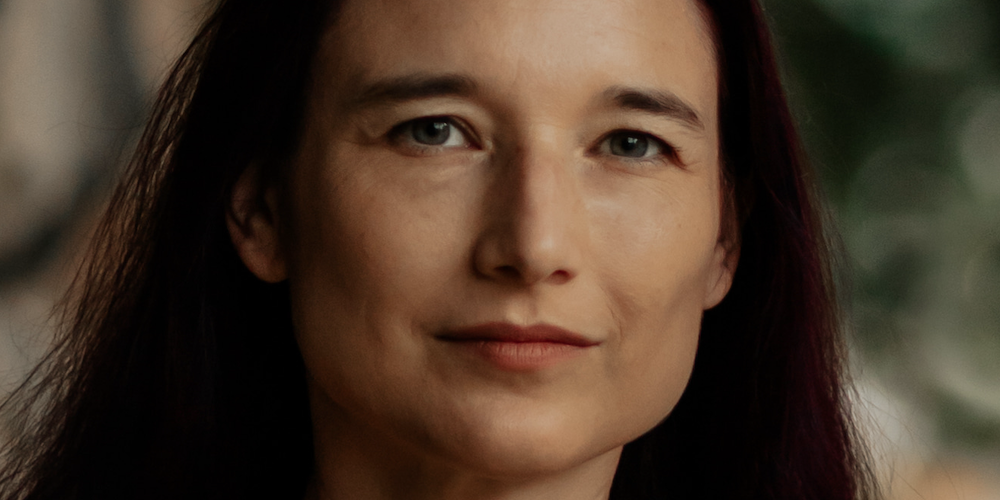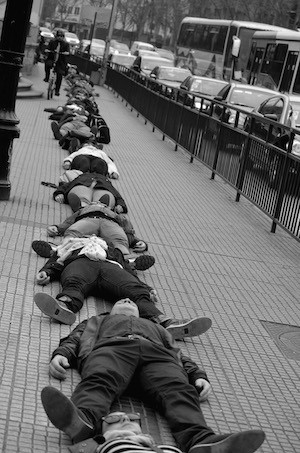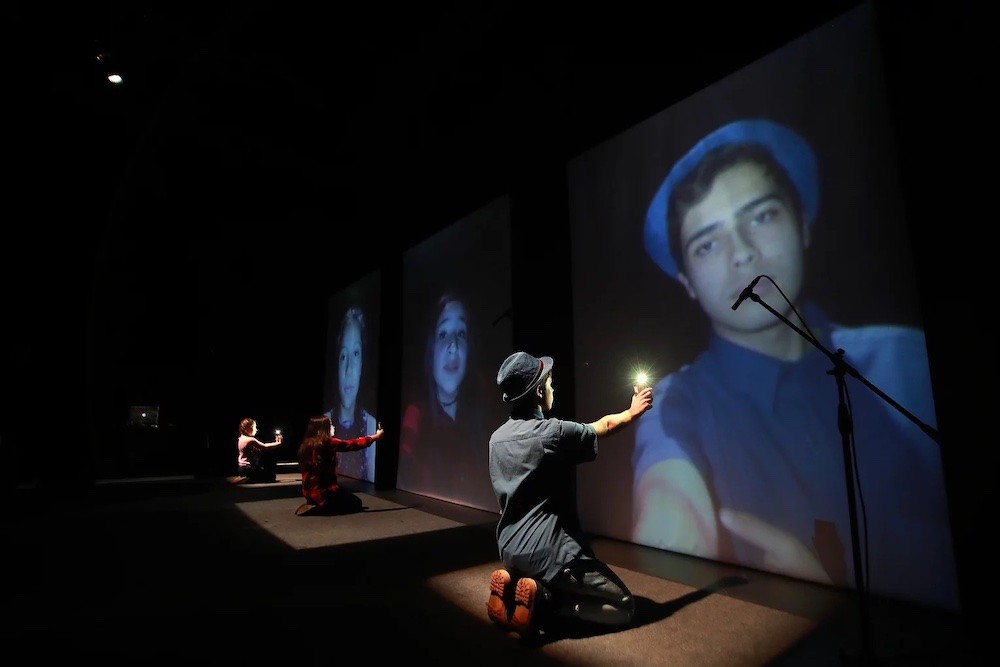This Is Who We Are: María José Contreras Lorenzini
Here, we talk with Theatre Associate Professor María José Contreras Lorenzini about her career as an artist, the perks of blending theory and practice, and why we should aim to be rigorously undisciplined.
This Is Who We Are is a series featuring Columbia School of the Arts’ professors, covering careers, pedagogy, and art-making. Here, we talk with Theatre Associate Professor María José Contreras Lorenzini about her career as an artist, the perks of blending theory and practice, and why we should aim to be rigorously undisciplined.
Associate Professor María José Contreras Lorenzini likes to quote Brazilian theatre practitioner and political activist Augusto Boal when speaking about dramaturgy. “For me, theatre is the rehearsal of revolution,” she said right off the bat in our interview. “How can artistic assembly be a training for the unpredictable and dangerous times we are living in?”
Contreras Lorenzini, a Chilean performance artist and a scholar who defines herself as a post-disciplinary artist, met me in a café to discuss her new position as a professor at Columbia University and her multidisciplinary interests that range from theatre productions to site-specific performances and urban interventions. During our time together, the conversation moved back and forth from her academic work, her theatre direction, and her performances—as if theory and practice were not only two sides of a coin but also deeply interrelated elements of the same art-making process. As she states on her website, “theory and practice are blended, brewed, (and served!) in my creative journey.”
“I always start with a question, and then I explore the different possibilities I have. Then I work collaboratively with other artists, and we figure out what genre works better to address the question,” Contreras Lorenzini said. “As an artist, I have questions that haunt me, and I can't get rid of them. Those questions revolve around the idea of embodied memories and how to collectively create spaces to process those difficult memories with others.”
“How can we create a space to share these bodily memories through conviviality and co-presence, allowing us to express these memories in a nonverbal way?”
Contreras Lorenzini’s career in theatre started with a plain rejection: forget about theatre, a director in Chile told her when she was barely 17 years old. “He was very dismissive. He told me that I was putting too much thought into acting. ‘Why don’t you go and study something theoretical? An actor that thinks will never be successful,' he told me.” Surprisingly, she followed his advice and studied psychology in Santiago de Chile, but she never stopped asking herself the questions that would later lead her back to theatre. After her undergraduate studies, she moved to Italy to follow her passion.
“I started working at Theatre Ridotto in Bologna, a theatre group that works with theatre research. They have a very intense physical training,” she said. “They work on performance research and then embody research to produce a final performance or theatre piece.” She got her PhD from Università di Bologna and founded her own theatre company in Bologna, where they did daily physical training and systematized practice-based pedagogies to not only do research through performance, but also embodying artistic research by “connecting in ways that exceed the artist-spectator relationship.”
“I've always been navigating between the scholarly work, the thinking, and the doing. And this also really responds to my relationship with the genealogies of Latin America and decolonial theory where the binary of the mind and the body is deconstructed and displaced,” she said. “It's like a practice of embodying theory, and at the same time, like theorizing embodiment.”
It’s impossible to fully grasp Contreras Lorenzini’s work in theatre without taking a closer look at her performances. She usually places herself in public spaces where a traumatic experience occurred, challenging the very notion of the viewer's memory, but, at the same time, helping them to process and heal a collective wound. In ‘Aquí’ (Here), for example, Contreras Lorenzini lay down in the same spot where the bodies of 11 women killed during the first four months of the dictatorship in Chile were found. “What kind of memories do our bodies keep? How can we communicate them by different means than spoken or written work? That’s part of my work both in theatre and performance art,” she explained. “How can we create a space to share these bodily memories through conviviality and co-presence, allowing us to express these memories in a nonverbal way?”
"As a daughter of a dictatorship, my childhood was marked by silence: The things you couldn’t say, the hushed conversations at home, the double meanings."
In #QuererNOver (#Notwanttosee), Contreras Lorenzini brought more than a thousand people to participate in a massive memory action in the streets of Santiago. In the context of the 40th anniversary of the military coup in Chile, they built a 2-kilometer line of people lying down in the streets to commemorate the more than 1,200 “detenidos desaparecidos” (detained disappeared) people in Chile.
Contreras Lorenzini’s main line of work both in theatre and in public performances explores the relationship between body and memory. “I was born in Chile during the dictatorship and grew up in an oppressive regime that shaped how we thought about life and its possibilities. As a daughter of a dictatorship, my childhood was marked by silence: The things you couldn’t say, the hushed conversations at home, the double meanings. ‘Do not repeat this at school,’ my parents usually told me,” she said. “It was part of a collective trauma that keeps heaping on your feelings, experiences and the memories that inhabit our bodies.”
As she repeatedly said, theatre, after all, has always been Contreras Lorenzini’s home. “I work with the methodology of performance as research. My theatre-making processes do not depart from a written text. They usually depart from a question and are strongly process-oriented. Inspired by the 'creación colectiva' (collective creation) from Latin America and by the work of the Odin Teatret, my approach to dramaturgy is to think in practice and practice thinking in the context of collaborative theatre-making practices.”
During our conversation, Contreras Lorenzini kept returning to the notion of dramaturgy as a shared function in a team. “My work as the director/dramaturg of the production is to propose the topic, theme or question, to build the conditions that allow every member to exercise their dramaturgical function, to organize and secure the creative process, and finally to select, edit and organize the materials provided by all the participants.”
She prefers to think about dramaturgy in different levels: the dramaturgy of the space, the dramaturgy of the actor, the dramaturgy of sound. “I always imagine the practice of dramaturgy as a moving mosaic, as a kaleidoscope that from simple elements produces a mesmerizing effect. For example, in Pajarito Nuevo la Lleva I worked with testimonies of children during the dictatorship. We invited spectators to watch the performance with earphones, listening to fragments of the original testimonies,” she said. “There were different versions, so depending on what you randomly got, you would hear one selection of testimonies or the other. Despite the different “soundtracks,” everyone saw the same action on stage. This play, published in The Methuen Anthology of Testimonial Plays, emerged from embodied research and implied multiple visions, labor and creativity coming together, just like pieces of a colorful kaleidoscope.”
“But diversifying the canon is not enough. We must consider approaching other traditions without instrumentalizing and exoticizing other practices.”
Contreras Lorenzini’s first classes at Columbia will start next Spring. Her teaching, she said, relies heavily on decolonizing the curriculum and teaching practices. “For me, decolonizing implies rethinking, reframing, and reconstructing the Western Euro-American canon to make it more inclusive and expanding, for example, expanding our notions of drama to consider different frameworks and traditions that can allow diverse perspectives to understand heterogenous theatre practices better,” she said. Contreras Lorenzini emphasized that expanding the curriculum doesn’t mean forsaking the poetics of Aristotle, but it does mean reading him while remaining aware of the historical factors that elevated this perspective among other theories of drama. “It is about expanding and supplementing perspectives, not narrowing. Artists today need to operate within and beyond the canon,” she said. For Contreras Lorenzini, a minimum step is to include cases that do not belong to the European canon. “But diversifying the canon is not enough. We must consider approaching other traditions without instrumentalizing and exoticizing other practices.”
Inspired by feminist and decolonial pedagogies, Contreras Lorenzini's teaching, in her own words, aims to build a learning environment that supports all students, where people’s identities, experiences, and backgrounds are acknowledged and valued, and where they can feel safe to take risks in their intellectual journey. “I would describe my dramaturgy practice as feminist. An important part of my work is facilitating inclusive, critical, generous, and caring relationships between the people involved in theatre-making and the plays we stage, the theories we use, the audience we convene, and the institutions where we operate. Also, my courses are never exclusively theoretical or practical. I strive to practice theory in theory-driven courses, and in practice-driven courses, we strive to theorize practice.
As the interview was closing, I asked her, almost apologizing in advance, what advice she would give to her younger self. She chuckled and winced, but then she came up with an entrancing piece of advice:
“If you want to be an artist, you have to learn how to be rigorously undisciplined,” she said, laughing but completely serious. In fact, Rigorously Undisciplined will be the title of her next book. I asked her, laughing as well, but as captivated as I’d been during the whole interview, to break the two concepts down. “You need to be rigorous in your discipline because what you do matters in our social and political context. But you also have to be undisciplined,” she said, with a grin. “You need to look beyond what is established, beyond disciplinary borders that tell you what to do, and find your own voice.”
María Jose Contreras Lorenzini is a Chilean performance artist and scholar. She has published chapters in international volumes such as Múltiplos Olhares Sobre Processos Descoloniais nas Artes Cênicas (Brasil, 2018), Feminism and Affect in Neoliberal Times (Palgrave, 2017), Frontières & dictatures. Images, regards (L’Harmattan, 2016). She has recently served as co-editor of Women Mobilizing Memory (Columbia University Press 2019). She is one of 70 international artists featured in The Twenty-First Century Performance Reader (Routledge 2020).


